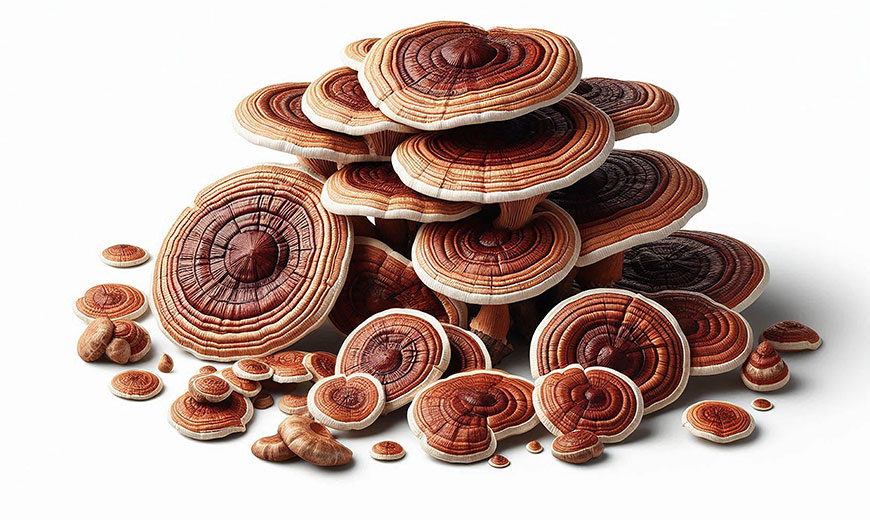The Reishi mushroom, also known as the “mushroom of immortality”, has been used in Eastern medicine for thousands of years. In the past, it was so valuable that only royalty could afford it. Reishi was considered a symbol of good health and longevity.
Today, scientists are studying the chemical composition of the mushroom to better understand its health benefits and how it can be incorporated into modern health practices. In this article, we will look at the potential benefits of using the Reishi mushroom .
What is Reishi?
Reishi is a type of mushroom of the genus Ganoderma lucidum, which is recognized by its characteristic kidney-shaped shape and shiny surface. The most common color of this mushroom is red, but there are other colors such as black, blue, white, yellow and purple, each with unique properties.
This fungus grows on rotting logs of deciduous trees. It can be found in the temperate and subtropical forests of Asia, Europe and North America.
Reishi contains over 400 bioactive compounds, including polysaccharides and triterpenoids, which are thought to be responsible for its health benefits. According to research, these compounds can strengthen the immune system , reduce inflammation in the body, and relieve fatigue and depression.
Potential Health Benefits of Taking Reishi
Reishi mushroom offers a number of research-based health benefits:
Support for cellular health
Reishi is known for its positive effect on cellular health. The polysaccharides in the mushroom can stimulate the immune system and support healthy cell growth. Various studies have shown that it has the ability to support the body’s natural defense mechanisms.
Mental health and well-being
Reishi can help reduce anxiety, depression and stress. It functions as an adaptogen that facilitates coping with stress and improves sleep quality. A randomized controlled trial showed that participants taking Reishi felt happier and more satisfied with their lives.
Immune system support
The mushroom contains active compounds that strengthen immune function by activating immune cells and increasing cytokine production. Reishi can help protect against infections and relieve symptoms of autoimmune conditions .
Antioxidant effects
Reishi has strong antioxidant properties that protect cells from damage caused by free radicals. It supports the activity of important enzymes that neutralize oxidative stress and have anti-aging benefits.
Liver function
Reishi mushroom has supportive effects on liver health, regulating liver enzymes and reducing harmful reactions that can damage liver cells. It also helps prevent liver diseases.
Cardiovascular health
Reishi has the ability to support cardiovascular health by regulating blood pressure and cholesterol levels. The antioxidant properties of the mushroom contribute to the health of the cardiovascular system.
How to use Reishi mushroom?
Reishi mushrooms can be a useful addition to a healthy lifestyle. Here are basic guidelines for dosage forms and recommended dosages:
Variety of shapes
Reishi mushrooms come in a variety of forms, including:
- Extracts: Concentrated forms that provide high levels of active ingredients.
- Powders: Easily digestible and suitable for adding to drinks and food.
- Teas: A popular form of consumption that combines traditional taste with health benefits.
The recommended dosage of Reishi mushroom may differ depending on the form of the product and individual health needs. It is good to start with a lower dose, which is gradually increased by observing the effects on the body.
Safety and side effects
Taking Reishi mushrooms is generally considered safe, but high doses or long-term use may cause some side effects:
- Digestive problems: Stomach upset, diarrhea or constipation may occur.
- Allergic reactions: Skin rashes or difficulty breathing are possible.
- Liver problems : Long-term use of high doses can affect liver function, so regular monitoring is recommended.
Reishi can also interact with some medications, such as:
- Anticoagulants and antiplatelet agents
- Immunosuppressive drugs
- Medicines for high blood pressure
Recommendations for safe use
- Medical supervision: Consult a doctor, especially if you have health problems or are taking other medications.
- Start with low doses: Assess tolerability and increase dose gradually.
- Monitor your health regularly: Check liver function and blood pressure, especially at higher doses.
- Awareness: Make sure you are informed about possible side effects and why it is important to report side effects.
In conclusion:
The medicinal mushroom Reishi, known for its long-standing use in Eastern medicine, is distinguished by numerous significant health benefits that are increasingly being studied and confirmed by modern science. This mushroom contains biologically active substances such as polysaccharides and triterpenoids, which have powerful anti-inflammatory, antioxidant and immunostimulating properties. Thanks to these ingredients, Reishi can support cell regeneration and protection, improve mental health and strengthen the immune system. These impressive health effects are of utmost importance in today’s society, which is subject to high levels of stress and a variety of health risks.
Reishi mushroom can be taken in a variety of forms, including extracts, powders, and teas, allowing for easy integration into a daily regimen. This flexibility allows each user to choose the most suitable way of use, depending on personal preferences and needs.
Despite the many positive effects, it is important to approach the use of Reishi with care. It is recommended to seek the advice of a medical professional before starting, especially if you have existing health conditions or are taking medication, to avoid potential side effects. Ultimately, the Reishi mushroom is a valuable natural product that can significantly contribute to improving overall health and quality of life.
Resources:
- Abate, M., Pepe, G., Randino, R., Pisanti, S., Basilicata, MG, Covelli, V., Bifulco, M., Cabri, W., D’Ursi, AM, Campiglia, P., & Rodriquez, M. (2020). Ganoderma lucidum Ethanol Extracts Enhance Re-Epithelialization and Prevent Keratinocytes from Free-Radical Injury. Pharmaceuticals, 13(9), 224. https://doi.org/10.3390/ph13090224
- Ahmad, MF, Ahmad, FA, Zeyaullah, M., Alsayegh, AA, Mahmood, SE, AlShahrani, AM, Khan, MS, Shama, E., Hamouda, A., Elbendary, EY, & Attia, KAHA (2023) . Ganoderma lucidum: Novel Insight into Hepatoprotective Potential with Mechanisms of Action. Nutrients, 15(8), 1874. https://doi.org/10.3390/nu15081874
- Chu, Q.-P., Wang, L.-E., Cui, X.-Y., Fu, H.-Z., Lin, Z.-B., Lin, S.-Q., & Zhang , Y.-H. (2007). Extract of Ganoderma lucidum potentiates pentobarbital-induced sleep via a GABAergic mechanism. Pharmacology Biochemistry and Behavior, 86(4), 693–698. https://doi.org/10.1016/j.pbb.2007.02.015
- Cloyd, J. (2023a, March 7). An integrative medicine approach to fatigue. Rupa Health.


